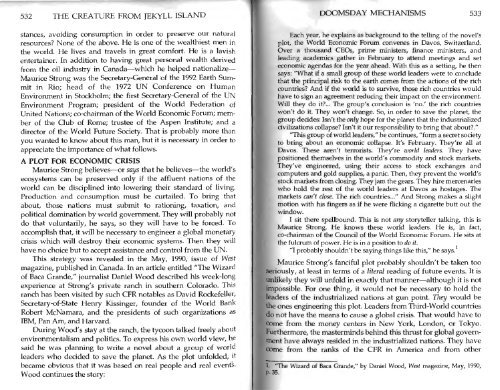You also want an ePaper? Increase the reach of your titles
YUMPU automatically turns print PDFs into web optimized ePapers that Google loves.
532 THE CREATURE FROM JEKYLL ISLAND<br />
DOOMSDAY MECHANISMS 533<br />
stances, avoiding consumption in order to preserve our natural<br />
resources? None of the above. He is one of the wealthiest men in<br />
the world. He lives and travels in great comfort. He is a lavish<br />
entertainer. In addition to having great personal wealth derived<br />
from the oil industry in Canada—which he helped nationalize—<br />
Maurice Strong was the Secretary-General of the 1992 Earth Summit<br />
in Rio; head of the 1972 UN Conference on Human<br />
Environment in Stockholm; the first Secretary-General of the UN<br />
Environment Program; president of the World Federation of<br />
United Nations; co-chairman of the World Economic Forum; member<br />
of the Club of Rome; trustee of the Aspen Institute; and a<br />
director of the World Future Society. That is probably more than<br />
you wanted to know about this man, but it is necessary in order to<br />
appreciate the importance of what follows.<br />
A PLOT FOR ECONOMIC CRISIS<br />
Maurice Strong believes—or says that he believes—the world's<br />
ecosystems can be preserved only if the affluent nations of the<br />
world can be disciplined into lowering their standard of living.<br />
Production and consumption must be curtailed. To bring that<br />
about, those nations must submit to rationing, taxation, and<br />
political domination by world government. They will probably not<br />
do that voluntarily, he says, so they will have to be forced. To<br />
accomplish that, it will be necessary to engineer a global monetary<br />
crisis which will destroy their economic systems. Then they will<br />
have no choice but to accept assistance and control from the UN.<br />
This strategy was revealed in the May, 1990, issue of West<br />
magazine, published in Canada. In an article entitled "The Wizard<br />
of Baca Grande," journalist Daniel Wood described his week-long<br />
experience at<br />
Strong's private ranch in southern Colorado. This<br />
ranch has been visited by such CFR notables as David Rockefeller,<br />
Secretary-of-State Henry Kissinger, founder of the World Bank<br />
Robert McNamara, and the presidents of such organizations as<br />
IBM, Pan Am, and Harvard.<br />
During Wood's stay at the ranch, the tycoon talked freely about<br />
environmentalism and politics. To express his own world view, he<br />
said he was planning to write a<br />
novel about a group of world<br />
leaders who decided to save the planet. As the plot unfolded, it<br />
became obvious that it was based on real people and real events.<br />
Wood continues the story:<br />
Each year, he explains as background to the telling of the novel's<br />
plot, the World Economic Forum convenes in Davos, Switzerland.<br />
Over a thousand CEOs, prime ministers, finance ministers, and<br />
leading academics gather in February to attend meetings and set<br />
economic agendas for the year ahead. With this as a setting, he then<br />
says: "What if a small group of these world leaders were to conclude<br />
that the principal risk to the earth comes from the actions of the rich<br />
countries? And if the world is to survive, those rich countries would<br />
have to sign an agreement reducing their impact on the environment.<br />
Will they do it?... The group's conclusion is 'no.' the rich countries<br />
won't do it. They won't change. So, in order to save the planet, the<br />
group decides: Isn't the only hope for the planet that the industrialized<br />
civilizations collapse? Isn't it our responsibility to bring that about?."<br />
"This group of world leaders," he continues, "form a secret society<br />
to bring about an economic collapse. It's February. They're all at<br />
Davos. These aren't terrorists. They're world leaders. They have<br />
positioned themselves in the world's commodity and stock markets.<br />
They've engineered, using their access to stock exchanges and<br />
computers and gold supplies, a panic. Then, they prevent the world's<br />
stock markets from closing. They jam the gears. They hire mercenaries<br />
who hold the rest of the world leaders at Davos as hostages. The<br />
markets cant close. The rich countries..." And Strong makes a slight<br />
motion with his fingers as if he were flicking a cigarette butt out the<br />
window.<br />
I sit there spellbound. This is not any storyteller talking, this is<br />
Maurice Strong. He knows these world leaders. He is, in fact,<br />
co-chairman of the Council of the World Economic Forum. He sits at<br />
the fulcrum of power. He is in a position to do it.<br />
'T probably shouldn't be saying things like this," he says.<br />
Maurice Strong's fanciful plot probably shouldn't be taken too<br />
seriously, at least in terms of a literal reading of future events. It is<br />
unlikely they will unfold in exactly that manner—although it is not<br />
impossible. For one thing, it would not be necessary to hold the<br />
leaders of the industrialized nations at gun point. They would be<br />
the ones engineering this plot. Leaders from Third-World countries<br />
do not have the means to cause a global crisis. That would have to<br />
come from the money centers in New York, London, or Tokyo.<br />
(Furthermore, the masterminds behind this thrust for global government<br />
have always resided in the industrialized nations. They have<br />
come from the ranks of the CFR in America and from other<br />
p. 35.<br />
"The Wizard of Baca Grande," by Daniel Wood, West magazine, May, 1990,


